
by Gideon Marcus
In the presence of greatness
This weekend, I attended a small gathering of SF fans in San Diego. I'd been invited to give a talk on the first season of Doctor Who, a new science fiction show currently playing across the Atlantic in the UK. While I've never actually seen any episodes (it doesn't air here, of course), thanks to the wonderful summaries of Jessica Holmes, and various promotional pictures and script transcripts I obtained, I was able to do a reasonable job of summarizing the Doctor's first year of adventures.
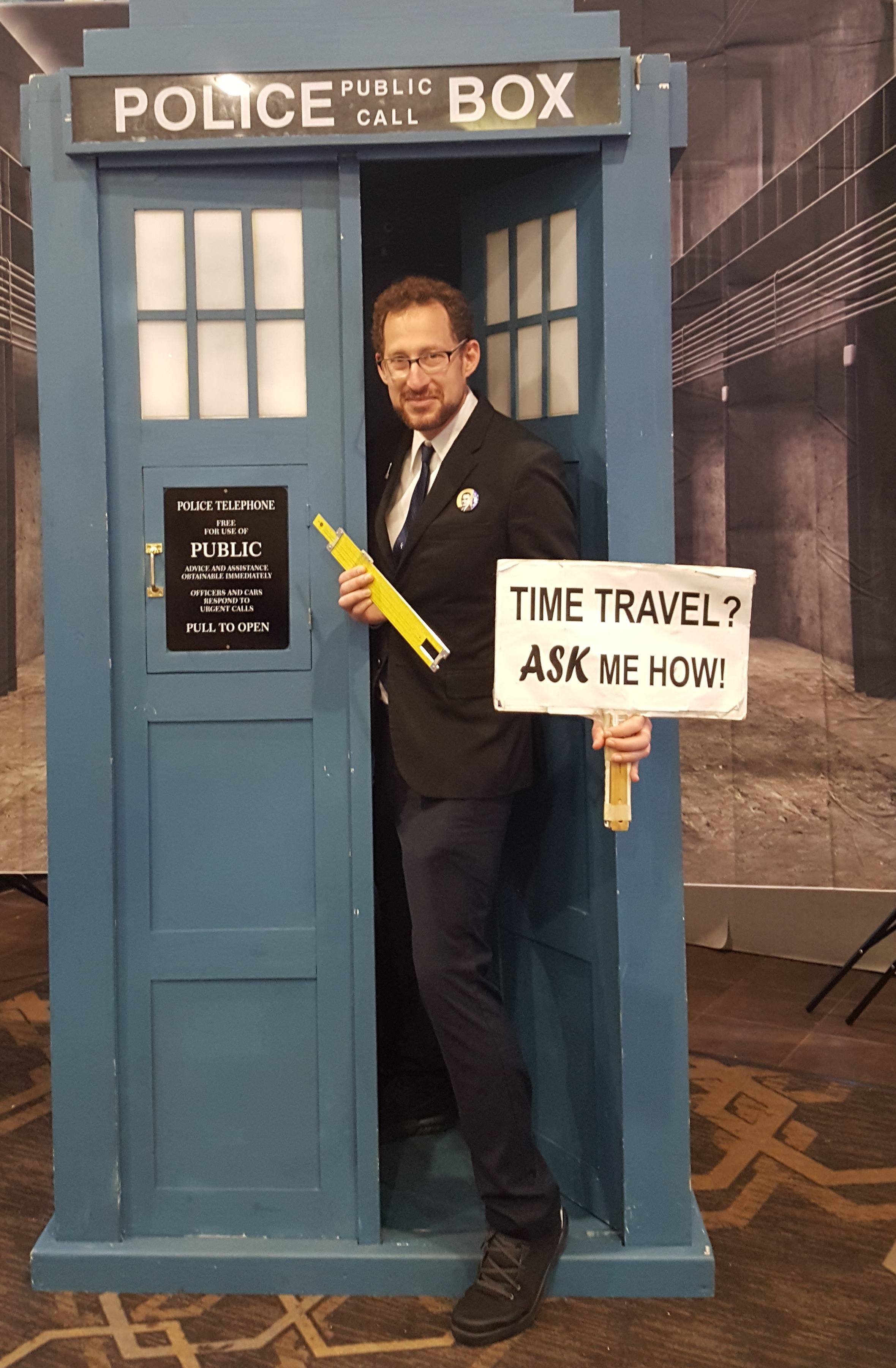
It appeared I wasn't the only one at this gathering who was familiar with Doctor Who — some enterprising fan had mocked up a full-size Dalek, one of the aliens featured on the show. It even had a little engine in it! Either that or the rope used to pull it along the floor was well-camouflaged…
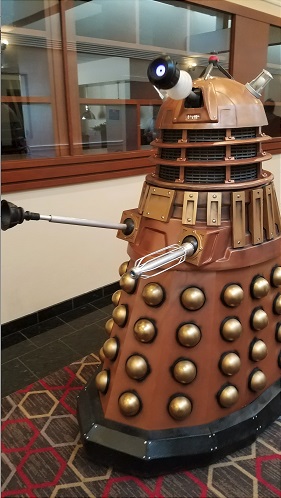
What I absolutely did not expect was a surprise appearance from none other than Verity Lambert, herself — she is the youngest and only woman producer for the BBC, and she runs the production of Doctor Who.

Does her presence in the States mean that her show will debut soon on American airwaves? Stranger things have happened — after all, Danger Man (Secret Agent) made the jump in 1961, not to mention Supercar and Fireball XL5.
Fingers crossed!
The Issue at Hand
In the quiet spaces of the day, I pulled out my copy of the latest issue of IF, which clearly was supposed to have an October cover date, but thanks to problems with the printer, went out with one for November. While this latest edition didn't have moments quite as stunning as those that transpired at the fan gathering, it was still worthy entertainment.
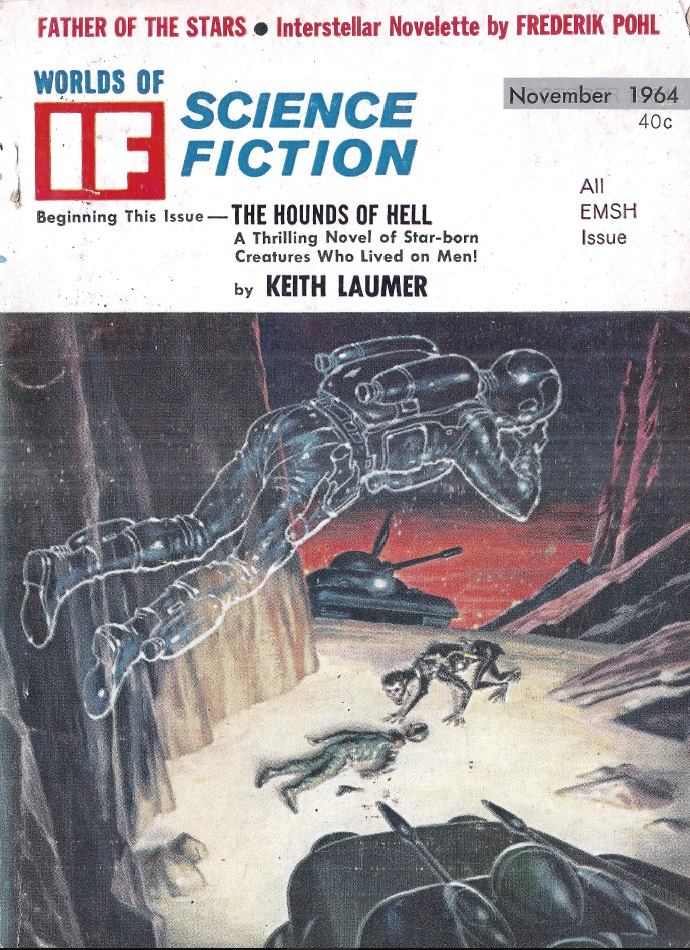
by Ed Emshwiller
The Hounds of Hell (Part 1 of 2), by Keith Laumer
We start on the baked desert city of Tamboula in the Free Republic of Algeria. It is the early 21st Century, and this Mahgreb city is a latter-day Casablanca where intrigue abounds by night, and by day, warring Moroccans and Algerians drink together in an intoxicated armistice. Enter Brigadier John Bravais, a secret agent posing as a journalist, sent to get the inside story on the North African conflict. At first, the story reads like an Earth-bound Retief tale, with a smart-allecky agent quipping his way out of the hearts of the local authorities.
But in the middle of a battle-torn wasteland, John encounters something most horrifying — a wolf-headed, human-handed alien, fearsome and supremely powerful, appears and kills an Algerian officer with his mind, proceeding to surgically remove and store his brain.
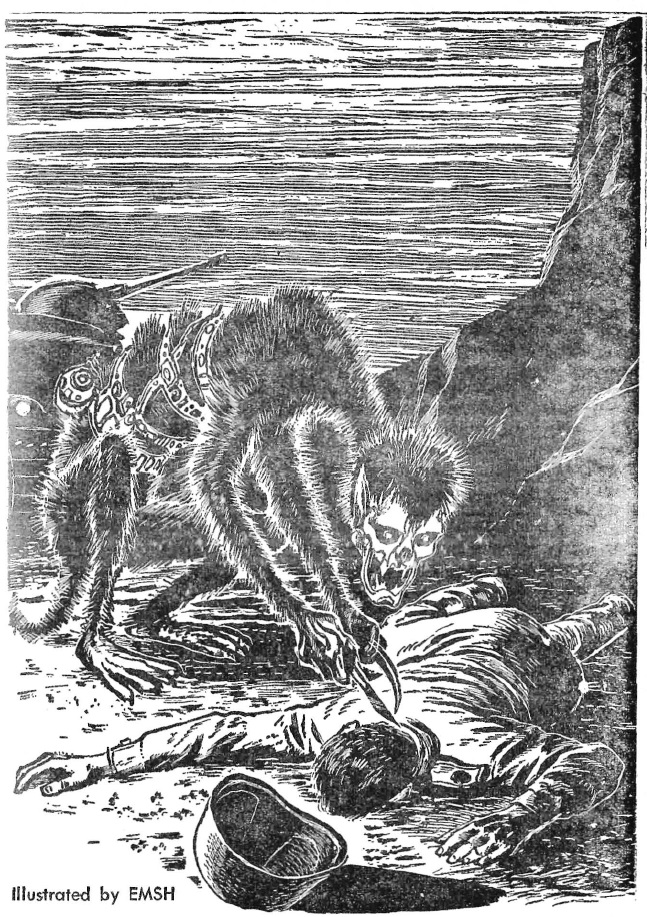
by Ed Emshwiller
The Brigadier is able to kill the alien, but when he returns to Tamboula to alert the authorities, he finds that the aliens are everywhere, in human guise, and with (apparently) android servants. Now Bravais must make it back to the United States before he is captured…but who will he find when he gets there?
Keith Laumer is a facile action writer, and once he settles in, this piece is engaging. The problem is, Bravais is a virtual cipher — his background, his personality, his motivations. The setting is a mere thumbnail (unlike, say, the future Africa of Mack Reynolds). And Laumer struggles with the bugaboo all writers (including me!) face when writing the first person viewpoint: excessive use of sentences starting with "I".
It may well be that this is a chopped down version, and when this two part serial be novelized, we'll get some expansion. As is, Hounds is a decent adventure but will not be one of Laumer's enduring classics.
Three stars.
The Perfect People, by Simon Tully
Thirty years to finish a doctoral thesis? It's possible, especially when the alien race you're studying remains stubbornly enigmatic. The "symetroids" spend their day strolling and eating, making perfect circuits of their sea-side area over the course of several months. They don't converse or use tools, yet their investigator is certain their is a pattern to their movements, a code to their sentience that he just needs a little more time to crack. Sometimes perfection is perfectly impenetrable.
Sadly, while this tale by neophyte Tully shows promise, its end does not pay off the beginning.
A high two stars.
The Ultimate Racer, by Gary Wright

by Ed Emshwiller
Newcomer Gary Wright's first work appeared in IF nearly two years ago. Captain of the Kali was an interesting tale of naval combat on an alien world. Wright's second work is more down to Earth, literally.
In Racer, it is the 1990s, and auto racing has become truly "auto" — due to the lethality of the sport, humans have been banned from the driver seat, and cars are remote controlled or self-driving. Among the sleek IBM-GMs and Volgas and Lotuses, one aging duo insists on racing their vintage 1980 Ferrarri. But on the eve of the big race, one of the car's solenoids goes kaput, making telemetered driving impossible.
If you've read the classic Matheson story, Steel, then you'll recognize where this is going. It gets there vividly and with great affection for the sport, but it also takes too a bit too long to reach the finish line.
Three stars.
The Diogenes Planet, by L. J. Stecher, Jr
How can a space merchant captain make a living if he's compelled to be 100% honest? It all hinges on what truths he decides to tell…
If this shaggy dog tale is not one for the ages, there is certainly nothing unpleasant about it. A good three stars.
Assassin & Son, by Thomas M. Disch
There's been much discussion here about how newcomer Tom Disch ranges from superb to, well, disappointingly less superb than he can be. Rest easy — this is one of the good ones.
Around the far sun of Sepharad lies a hot world inhabited by the blob-like and telepathic Sephradim. These seven-gendered aliens possess a particular racial quirk: when one is murdered, the killer augments their own powers with that of the victim. For this reason, murder is specifically and rigorously outlawed.
By other Sephradim.
And so, a busy import business of human assassins has built up. Highly esteemed and ritualized, the assassin tradition is a proud one, passed on from father to son. But what role can a second-born have in such a system? It's all a matter of opportunity.
Disch spins a beautiful tapestry here, creating truly alien extraterrestrials, and defining a unique culture that is as compelling as that of Frank Herbert's Dune World, developed with far fewer words. My only complaint is that the novelette reads like the first few chapters of a book. While being left wanting is usually a good sign, there is far too much left to be said!
Four stars…and fervent hopes for expansion.
Father of the Stars, by Frederik Pohl
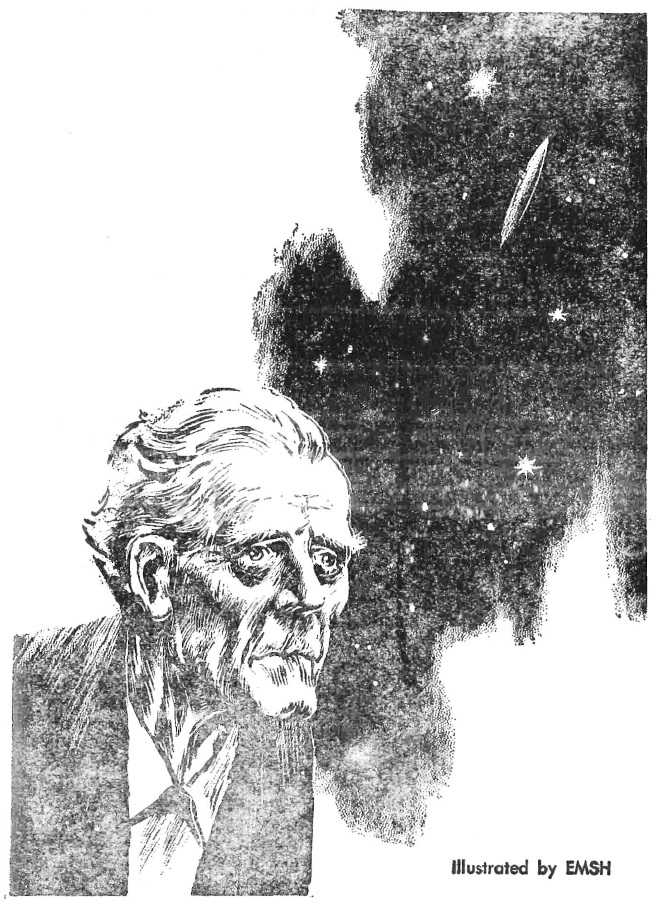
by Ed Emshwiller
So far as I know, Fred Pohl is the only editor who contributes significant amounts of his own material to his magazines. Far from being a self-aggrandizing enterprise, the issues in which his stuff appears are generally the better for it.
This concluding novelette features the last days of the man who gave humanity the stars, spending his fortune and life to fund 26 slower-than-light generation ships, only to see the development of FTL drives before any of the slowboats make planetfall. What place can this superseded man have in history?
While Pohl never turns in a bad piece, there's not a great deal to this story. This is a shame because the premise is fantastic, and I'd love to see a novel that expands on this theme. Imagine generations of humans living and dying in their tiny mobile world, and once they reach their destination, it's already fully inhabited. I know there have been stories that touch on the subject, but I don't think any have made it the central premise.
Add to that the superfluous bits about spacers grafting their consciousnesses to chimpanzees while their bodies remain in suspended animation, and the piece feels both undeveloped and misfocused.
But not bad. Three stars.
Things to Come
Between meeting Ms. Lambert and exploring the wealth of worlds offered in this month's IF, October has started with a bang. I can't wait to see what wonders the coming weeks have to offer!
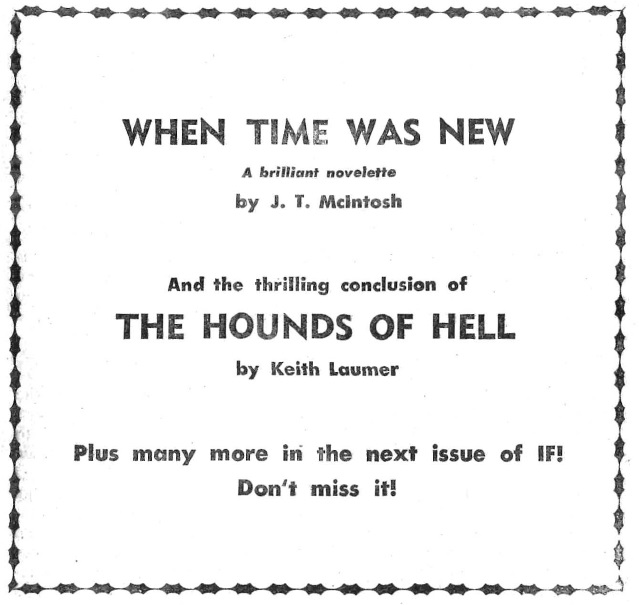
[Join us at Portal 55, Galactic Journey's real-time lounge! Talk about your favorite SFF, chat with the Traveler and co., relax, sit a spell…]

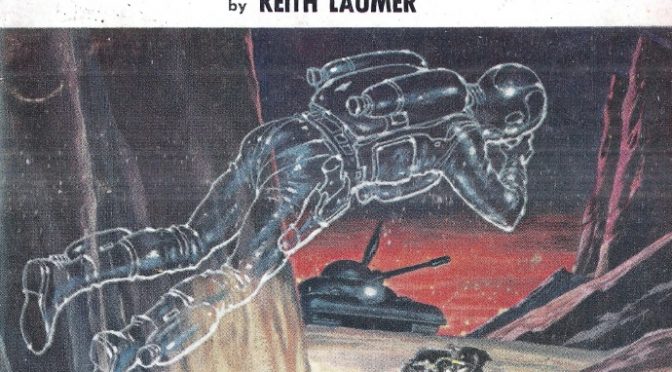

It looks to me as though If is going to be this month's top magazine. Analog has a new Piper novella, so there might be some competition there. We'll see.
Generally, Laumer in action-thriller mode is my least favorite Laumer. Somewhere along the line he eventually goes completely off the rails and things just get strange. I feared the worst when the aliens showed up, but so far this has been a decent read. The world-building is there, you just have to read between the lines. It seems that war is a carefully monitored business, with detailed plans and strict rules. A bit like Mack Reynolds's Joe Mauser stories.
A high two is a fair grade for "The Perfect People", maybe even a touch lenient. Did it have a point?
I enjoyed "Racer" quite a bit. John Henry applied to (I think) Formula One racing. I've developed a very minor interest in F1, really mostly just following it the paper, which may have helped me appreciate this story more than I might have.
"The Diogenes Planet" is by far the best of the Delta Crucis stories to date. That's a rather low bar to clear, but this was fairly enjoyable.
"Assassin & Son" was excellent. Disch at his best, no question. An expansion to novel length could be very interesting.
Fred Pohl does seem to contribute to his magazines quite a lot. It's hard to compare, though. He edits roughly half of the American science fiction magazines. Cele Lalli doesn't write, Campbell gave up writing decades ago (thank goodness). Davidson has run more than a few stories in F&SF under his tenure (often with the feeling that nobody else would buy them). It's early days, but Michael Moorcock might be heading toward running a lot of his own stuff, but he might be hard up for material at the moment.
In any case, "Father to the Stars" wasn't bad. Too long, and there was an awful lot of stuff that didn't seem to need to be there (like the chimpanzee thing). It seems almost a given in a SF story that when a generation/slower-than-light ship gets where it's going, the FTL people will have gotten there first. We usually see it from the explorers' perspective, though, not that of the driving forces who stayed behind. Oddly, this reminded me a bit of Edmond Hamilton's "The Pro" from last month. There's that same sense of resentment towards the next generation reaping the benefits and going farther than the old generation did or could. I find it hard to sympathize with that viewpoint. Envy? Certainly, but never resentment.
I was attracted to this issue by the promise of another Disch. Whilst I enjoyed it I think some of the writing he has already done for Fantastic earlier this year has been better.
And that is my general feeling about If, what Pohl states he wants to do with it Goldsmith does a lot better. If is probably my least favourite magazine on the market at the moment (whilst I have a lot of problems with Analog, the serials are usually good and the covers are pretty). A real shame as I love Galaxy and Worlds of Tomorrow.
So outside of the Disch I found this the usually low level I tend to find inside If:
I find Laumer's Retief stories tedious and this gave me much the same feeling. I won't be reading the second half.
The Perfect People and Diogenes Planet seemed pointless.
The Ultimate Racer seemed to read too much to me like juvenile "boys and their toys" stories, there is probably more to it but I have a personal bias against this kind of fiction and struggled to get through it.
I haven't found much of Pohl's work to be great recently, this is better than most of the rest of the issue but could have done with serious editing. I would wonder if it was that he wasn't editing his own work but the piece he wrote for Playboy earlier this year was disappointing as well. I miss his collaborations with Kornbluth (RIP).
So overall, good to get some more Disch but hasn't done anything to disabuse my negative notions of the magazine.
Fantastic is definitely a good read…of course Victoria is lucky enough to get that one!
I failed to understand why the "people" in "The Perfect People" were perfect. That, and the absurdity of studying such uninteresting aliens for thirty years made it hard for me to get anything out of the story.
"The Ultimate Racer" wasn't bad. I don't share the author's obvious passion for cars, so I'm sure I missed some of the appeal.
"The Diogenes Planet" was OK. The "honest" escape plan was clever.
"Assassin & Son" was an interesting bit of world-building, but I really felt as if I had just walked off the tenth step of a staircase with only nine steps. What happens next?
I liked "Father of the Stars" quite a bit. I don't think the subplot of placing human minds in chimp bodies was superfluous. Besides allowing for an ironic final scene, it can also be seen as a symbol of FTL "evolving" from slower than light space travel; the protagonist feels like a fossil compared to the new space explorers.
I thought I was able to respond the other day. Congrats on the Rod Serling Award! I grew up with him in Ithaca NY back in the 1960's and know quite a bit about him…even where he is buried! At the end of each TZ episode is "Cayuga Productions". He had a nice house on Cayuga Lake…..
Thank you, Herman! I did receive your letter — it came to me privately, and I responded in similar fashion. I would check your mail box.